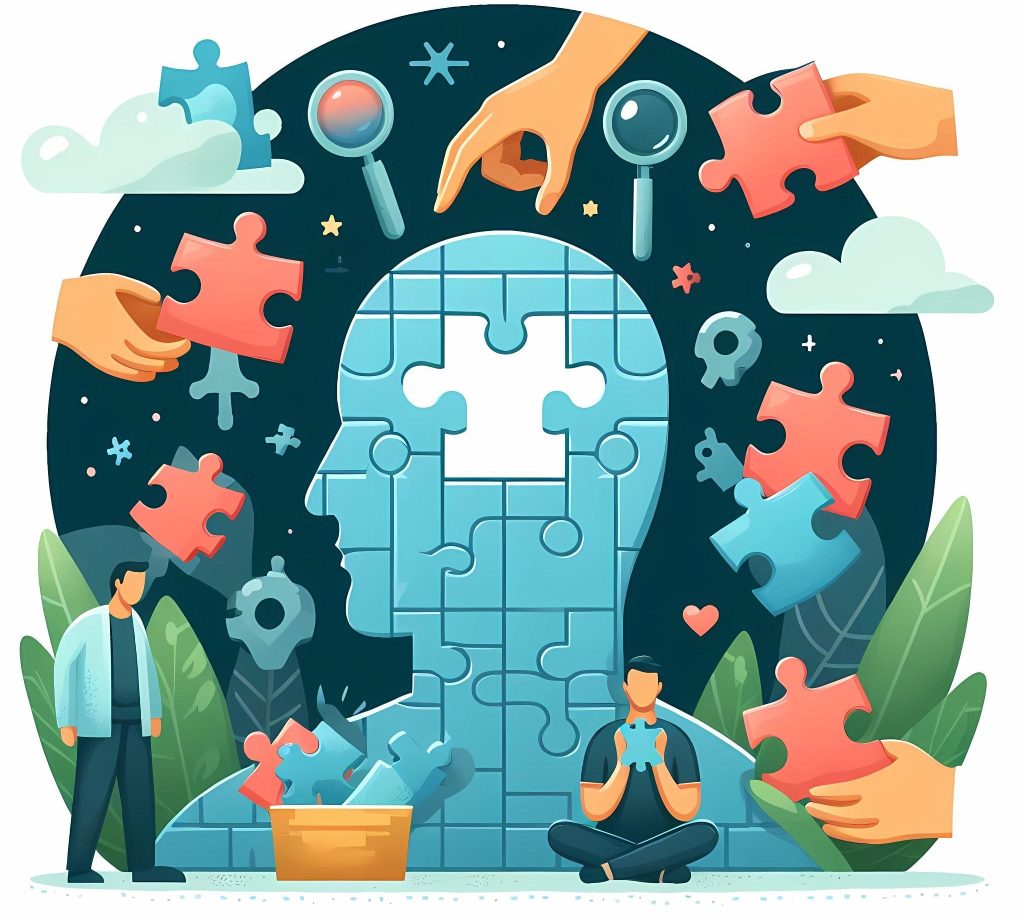COGNITIVE BEHAVIORAL THERAPY (CBT)

- Psychological problems are based, in part, on faulty ways of thinking.
- Psychological problems are based, in part, on learned patterns of unhelpful behavior.
- People suffering from psychological problems can learn better ways of coping with them, thereby relieving their symptoms and becoming more effective in their lives.
BENEFITS OF COGNITIVE BEHAVIOURAL THERAPY:
Cognitive behavioral therapy (CBT) helps you recognize the strong link between your thoughts, feelings, and actions. It is goal-oriented and team-based, and its purpose is to give you the skills to control your thoughts and emotions. It gradually gives you more power, lowers tension, and enhances your general well-being.
Cognitive behavioral therapy operates in the following way:
- Recognizing Negative Ideas: The first step in cognitive behavioral therapy (CBT) is to identify the unhelpful or damaging ideas that are causing your anxiety or suffering. For instance, "I'm not good enough" or "Something horrible is going to happen" are possible thoughts. These ideas have the power to influence your feelings and behavior.
-
Reframing and Challenging Thoughts: After recognizing the faulty ideas, we collaborate to contest their veracity. Are they predicated on assumptions or facts? Are there more realistic, balanced viewpoints available? This stage gives you a clearer picture of your circumstances and lowers needless anxiety or concern. The common strategies are:
• Facing one's fears instead of avoiding them.
• Using role-playing to prepare for potentially problematic interactions with others.
• Learning to calm one's mind and relax one's body. - Modifying Behavior Patterns: CBT also discourages actions that contribute to pessimistic thinking. For example, avoiding social settings because you are afraid can make your anxiety worse. By gradually exposing yourself to these circumstances, most likely with the help of a trained mental health professional, you can break the cycle and gain confidence.
DO I NEED COGNITIVE BEHAVIOURAL THERAPY?
Research suggests that people with a variety of emotional and psychological issues can benefit from the adaptable and successful treatment known as cognitive behavioral therapy (CBT). As a therapist, I believe that CBT can help anyone dealing with the following problems:
- Anxiety and Panic Disorders: Cognitive behavioral therapy (CBT) can assist you in comprehending and confronting the thoughts that contribute to your anxiety if you find yourself worrying nonstop or having severe panic episodes. Additionally, it offers coping mechanisms and relaxation techniques to control physical symptoms.
- Depression: Depressed people frequently have negative thought patterns, such as a sense of worthlessness or hopelessness. CBT improves mood and outlook by assisting in identifying these thoughts and their replacement with more realistic, healthy viewpoints.
- Phobias: Whether you're afraid of spiders, heights, or social situations, cognitive behavioral therapy (CBT) can help you face your fears in a controlled, controllable manner, eventually lessening your avoidance and anxiety.
- Relationship Problems: Cognitive behavioral therapy (CBT) can enhance communication and settle disputes by teaching people how to alter harmful thought and behavior patterns in relationships.
- Stress and Burnout: Cognitive behavioral therapy (CBT) provides strategies to manage stress, enhance problem-solving abilities, and establish healthy boundaries. This approach by a therapist helps alleviate feelings of burnout caused by work, relationships, or other life responsibilities.
- Grieve & Loss: Cognitive behavioral therapy (CBT) can assist you in processing your feelings, confronting negative thought patterns, and identifying constructive coping mechanisms if you're experiencing grieving.
A WORD FROM MENTAL NURTURING:
Anyone looking to take charge of their mental health can benefit from cognitive behavioral therapy (CBT), regardless of whether they are struggling with a specific mental health condition like depression or anxiety or want to improve their resilience and learn more effective coping mechanisms for life's pressures. Most forms of CBT include the use of strategies like self-monitoring, goal setting, modifying unrealistic thoughts, stress management, and social support. Internet-based cognitive behavior therapy is emerging as a promising treatment that expands access to treatment for psychiatric disorders. Research indicates that the technology is increasingly utilized in CBT interventions, showing effectiveness comparable to face-to-face sessions.
Cognitive Behavioral Therapy (CBT) is intended for anyone seeking to live with greater clarity, confidence, and emotional resilience. This hands-on approach by a trained mental health professional assists individuals in breaking free from negative thought patterns and achieving mental wellness.
RESOURCES:
1- Foreyt, J. P., & Poston, W. S. C., II. (1998). What is the role of Cognitive‐Behavior therapy in patient management? Obesity Research, 6(S1).
https://doi.org/10.1002/j.1550-8528.1998.tb00684.x
2- Website, N. (2024, November 20). Overview - Cognitive behavioural therapy (CBT). nhs.uk.
https://www.nhs.uk/mental-health/talking-therapies-medicine-treatments/talking-therapies-and-counselling/cognitive-behavioural-therapy-cbt/overview/
3- What is Cognitive Behavioral Therapy? (2017, July 31). https://www.apa.org.
https://www.apa.org/ptsd-guideline/patients-and-families/cognitive-behavioral
4- Chand SP, Kuckel DP, Huecker MR. Cognitive Behavior Therapy. 2023 May 23. In: StatPearls [Internet]. Treasure Island (FL): StatPearls Publishing; 2025 Jan–. PMID: 29261869.

Written by:
Rumsha Abdul Aziz, MS Psychology,
On January 18, 2025

